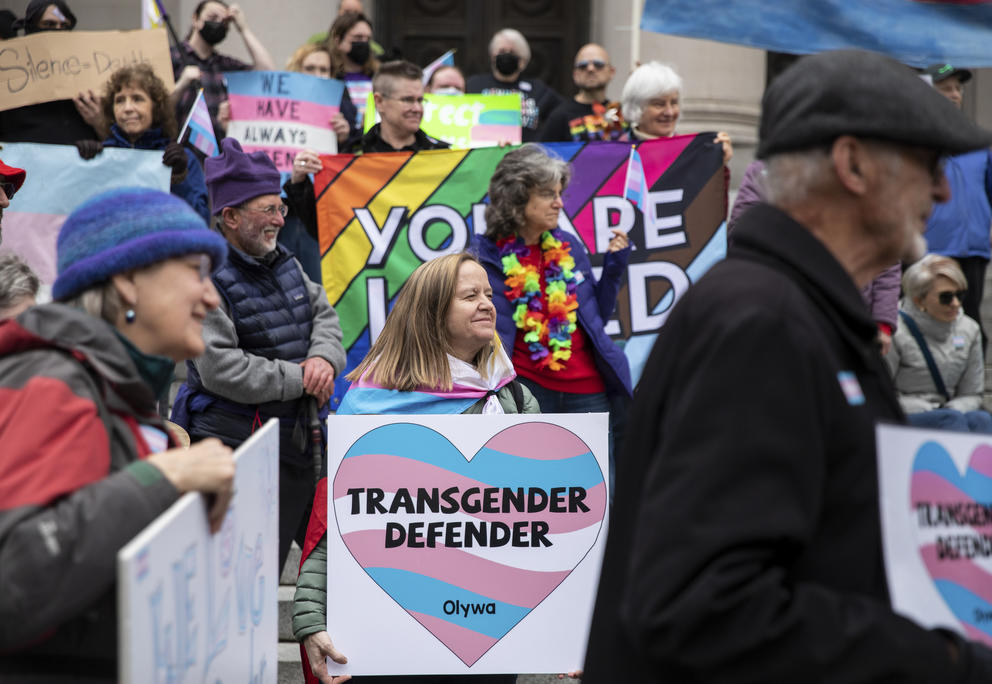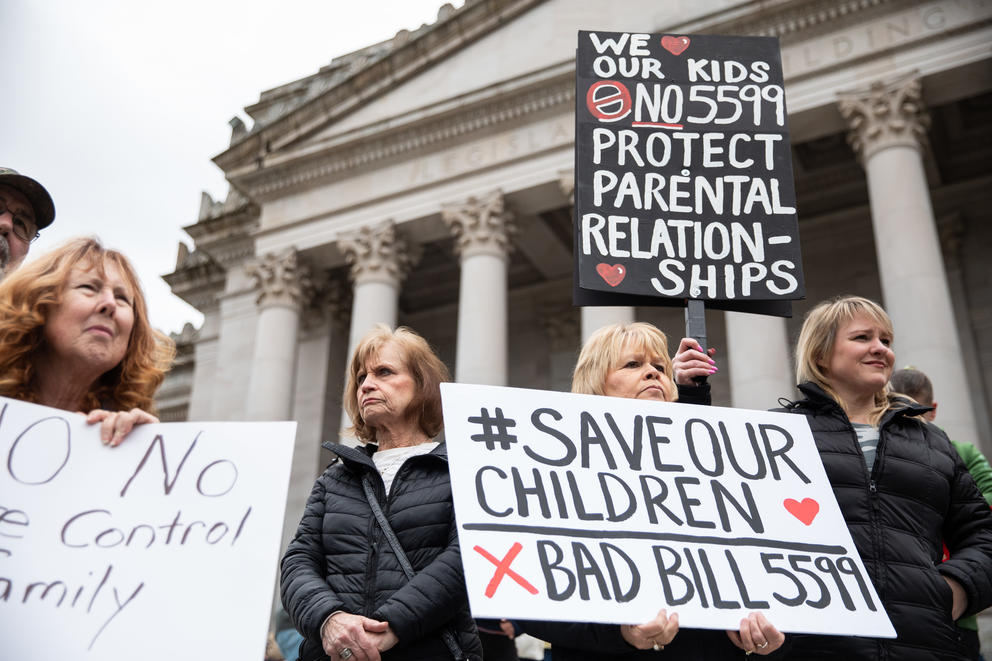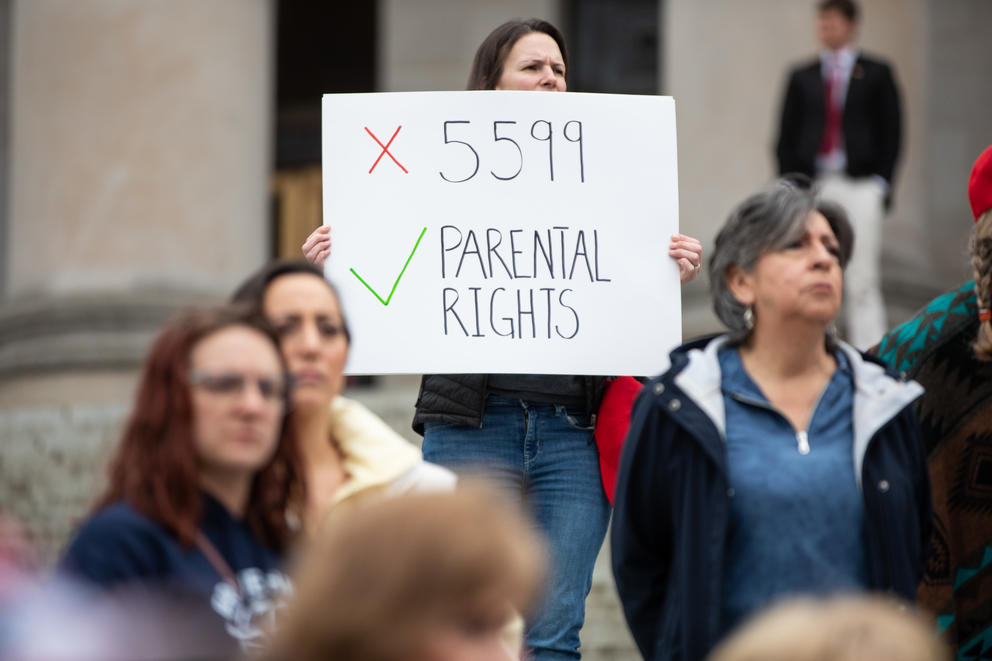At arguably the first contentious demonstration at the Capitol in a year, roughly 100 people gathered to oppose the bill, chanting, among other things, “U.S.A.” One person held a sign that read “Boys aren’t girls.” On the other side were about 250 counter-demonstrators, giving speeches in support of trans youth and the LGBTQ+ community. Between the two groups were barricades and dozens of Washington State Patrol troopers to make sure the day remained peaceful.
First elected in 2008, the Everett Democrat, who spoke at the counter-demonstration, has seen opposition to the LGBTQ+ community come in waves. He found the furor over SB 5599 comparable only to the Tea Party movement a decade ago.
“I will say that this is definitely one of the worst reactions I’ve seen, the vitriol, the rhetoric,” said Liias, a member of the Senate LGBTQ+ caucus. “And as I was walking back to the Capitol, I was surrounded by people who were screaming at the top of their lungs.”
Roughly 100 people gathered on the steps of the Capitol in Olympia to oppose Senate Bill 5599, while 250 counter-demonstrators attended to support trans youth and the LGBTQ+ community on Friday, April 21, 2023. Between the two groups were barricades and dozens of Washington State Patrol troopers to make sure the day remained peaceful. (Amanda Snyder/Crosscut)
Approved in the Democratic-controlled House and Senate along party-line votes, Senate Bill 5599 expands an existing law that allows organizations providing services to unsheltered youth to delay notifying a parent or guardian if there is a compelling reason not to, such as abuse or neglect. SB 5599 adds to these reasons youth who are seeking protected healthcare services, which include gender-affirming treatment and reproductive health care. Gender-affirming care includes an array of treatments ranging from therapy to, in rare cases, surgery.
The bill awaits Gov. Jay Inslee’s signature. In recent weeks, the legislation became tangled in a broader push by opponents questioning whether the state should provide services or protections for transgender people – which includes concern over the rights of parents. The spotlight went national when Donald Trump, Jr., in a tweet called the legislation “evil.”
Liias and others point to a recent New York Times report outlining how national right-wing groups are using the issue to capture high emotions amid a broad shift in gender norms.
“To raise money, to whip up momentum on the far right, I think we see that at play here,” he said.
The contentious debate in Washington comes amid broader pressure against LGBTQ+ communities around the region. In the Montana Legislature last week, a transgender lawmaker was barred from that state House for what was called a breach of decorum during a debate about gender-affirming care. On Friday, Montana Gov. Greg Gianforte signed a law banning transgender care for minors. Last autumn, demonstrators faced off with each other at a drag-queen story hour in Wenatchee. And in October 2022, protesters threw rocks and smoke bombs at a similar event in Eugene, Oregon.
Washington Gov. Inslee on Thursday signed a package of reproductive health and gender affirming care bills. “The right of choice is an issue of freedom,” Inslee said in a statement. “Health care must remain the providence of individual Washingtonians. These laws will keep the tentacles of oppressive and overreaching states out of Washington.”
About 250 counter-demonstrators gathered in support of transgender youth and the LGBTQ+ community at the Washington Capitol in Olympia on Friday, April 21, 2023. Approved in the Democratic-controlled House and Senate along party-line votes, Senate Bill 5599 expands an existing law that allows organizations providing services to unsheltered youth to delay notifying a parent or guardian if there is a compelling reason not to, such as abuse or neglect. (Amanda Snyder/Crosscut)
Roughly 100 people, organized by Conservative Ladies of Washington, gathered to oppose Senate Bill 5599 on the steps of the Capitol on Friday, April 21, 2023. Opponents of SB 5599 focused their arguments on claiming that the bill violates parents’ rights of primary authority over their children. (Amanda Snyder/Crosscut)
Meanwhile, legislation opposing transgender rights and services has been introduced around the nation over the past year. As of March, approximately 156,500 transgender youth live in 32 states where legislation has been introduced to restrict or ban gender-affirming care, according to the University of California Los Angeles School of Law Williams Institute. That compares to 21 states last March that had seen such legislation, according to the institute.
Deirdre Bowen, professor of law at Seattle University and director of the Family Law Center, said the public controversy reminds her of previous efforts to pass laws protecting the LGBTQ community.
The bill could have been written more clearly to help people understand what it does and doesn’t do, according to Bowen, which could have helped dispel some misconceptions about it.
But “the outrage and fear expressed about any care or consideration or support that’s offered to trans youth reminds me of the moral panic that existed in the early days of when we started to recognize and appreciate the value of same-sex relationships or same-sex couples’ ability to have families,” Bowen said.
Roughly 100 people, organized by Conservative Ladies of Washington, gathered on the Capitol steps on Friday, April 21, 2023 to oppose Senate Bill 5599. The bill awaits Gov. Jay Inslee’s signature. In recent weeks, the legislation has become tangled in a broader push by opponents questioning whether the state should provide services or protections for transgender people – which includes concern for the rights of parents. (Amanda Snyder/Crosscut)
Trans youth and mental health
Of the 1.8% of youth in the U.S. who identify as transgender, approximately one in three reports attempting suicide, according to the Trevor Project, a nonprofit organization that seeks to reduce suicide in the LGBTQ+ community.
“We know that there’s [a] really high risk of mental health [issues] leading up to suicide for this population,” said Liias. “I’ve spoken to young people who have thankfully survived suicide attempts, but who share their stories of how difficult it is to live in environments where they are not just not receiving support, but their family members are actively contributing to the unsafe circumstances that led them to that place.”
Under current state law, organizations that provide services to homeless or runaway youth must notify an underage person’s family of their location within 72 hours unless there is a compelling reason – such as evidence of abuse or neglect – to not do so, according to a legislative analysis of SB 5599. If it is not in the interest of the minor’s safety to contact their family, the Department of Children, Youth and Families (DCYF) is notified instead.
Once DCYF is notified of a minor’s location at a shelter or licensed host home, they are required to offer a referral for appropriate behavior health services as well as services designed to resolve family conflict and support reunification, according to that analysis.
Licensed host homes, an alternative to youth shelters, are also required to report a minor’s participation in that program to the DCYF every month, according to a legislative analysis of the bill and reiterated by Bowen.
“The reason for this is, again, not to create a situation where the youth is going to be isolated from the parents and kept by the state, but rather to open up lines of communication, resolution, and support between the parent and the child regardless of whether it's at a homeless shelter or these host homes,” said Bowen.
Conservatives opposing SB 5599 have focused their arguments on saying the bill violates parents’ rights to have primary authority over their child.
“During floor debate, we heard the tired old cliche that ‘It takes a village to raise a child.’ That’s false,” said Rep. Jim Walsh, R-Aberdeen, in a statement. “That notion has resulted in exploding crime rates, homelessness and rising teen suicide rates in Washington. Enough. Parents are the primary stakeholders in their children’s upbringing ― not the government.”
In an email urging residents to encourage Inslee to veto the bill, Caleb Heimlich, Washington State Republican Party chairman, called SB 5599 part of Democrats’ “radical agenda.”
Another lawmaker who opposed the bill did successfully sponsor amendment 742, which ensures that data on unsheltered homeless minors is collected by the Office of Homeless Youth Prevention and Protection, which is supposed to use that data to develop recommendations for supporting unsheltered youth and present those ideas to the appropriate legislative committees by July 1, 2024.
Liias reiterated that the bill itself doesn’t make changes to existing laws surrounding the medical care of youth.
“It doesn’t talk about who can access medical services, it doesn’t talk about the age you can access those services,” he said, adding: “That’s all existing law. It builds on existing policy that says if there’s compelling reasons why getting parent contact right away doesn’t work, you can give more space and more time on that.”
Get daily news in your inbox
This newsletter curates some of the most important headlines of the day from Crosscut and other news outlets.












